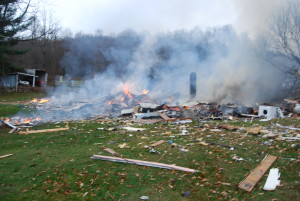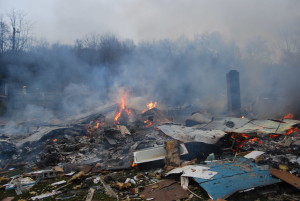Fires and Explosions
West Virginia Fire Damage Attorneys
In cases where people are injured or killed in fires and explosions, there will usually be fire fighters, fire marshals, insurance company investigators, insurance company lawyers and private fire investigators involved in determining the origin and cause of the fire or explosion. The reports of public agencies, such as fire incident reports and fire marshal reports, must be made available under the Freedom of Information Act. However, insurance companies, their investigators and their lawyers have no obligation to share their findings with the public. In fact, when insurance company findings are detrimental to their policyholders, they rarely disclose their findings to outside parties.
Preservation of evidence is important in all cases where someone is injured or killed, especially in fire cases. Fire and explosion victims cannot rely on insurance companies, insurance adjusters/investigators or insurance company lawyers to preserve evidence if that evidence is adverse to the insurance company. Victims should retain an experienced fire and explosion lawyer immediately so that the lawyer can send target letters to all persons or entities involved in the fire requesting preservation of all evidence. This prevents negligent parties and their insurance companies from disposing of or discarding evidence that may be incriminating to them and may be necessary for victims to collect insurance benefits.
An experienced fire and explosion lawyer will utilize his/her own investigators and fire experts, as well as fire code and building code safety experts where necessary. These cases are not only about what caused the fire or explosion, but also what contributed to the victims’ inability to escape without being harmed or killed. That is why experts who can testify in court must analyze safety and building codes pertaining to smoke detectors, emergency exits, fire extinguishers, sprinkler systems, etc. In cases where fires are caused by electrical systems or components, an electrical engineer is necessary. Where there are gas leaks, a plumbing and/or steam-fitting expert is necessary. This kind of prompt action is necessary to level the playing field against insurance companies that have greater financial resources than victims.
Chris Heavens began his legal career with a private law firm that worked for insurance companies on fire and explosion litigation. Mr. Heavens handled fire/explosion litigation for major insurers and worked with the best fire/explosion investigators in the country. His experience in litigating fire and explosion cases from the defense perspective gives him an invaluable advantage in taking on insurance companies for people who are harmed or lose a loved one in a fire or explosion. Mr. Heavens conducted seminars for insurance adjusters providing instructions on the application of NFPA 921. Mr. Heavens also conducted numerous Examinations Under Oath (EUO) for insurance companies on fire cases before he stopped doing corporate work and began exclusively representing plaintiffs. Victims of fires and explosions should try to retain a lawyer with this kind of background.
People understand that a fire or explosion can cause untold devastation in the lives of homeowners or workers. These accidents often involve serious injury or death, and often victims or their survivors have no idea how to handle the tremendous medical bills and other costs that can result. Because of the devastation caused to the lives of people by fires and explosions, people are often unable to take action necessary to protect their legal rights. The last thing on their minds is contacting a lawyer. Unfortunately, insurance companies are often the beneficiaries of the inaction of victims.
There are several categories of fire and explosion accidents that involve various types of combustion. Car fires, house fires, and workplace fires are common events that can be triggered by a variety of causes. Explosions in mines, industrial plants, and even residential homes from gas leaks all fall under the categories of combustion accidents. Combustion, which is a chemical reaction triggered in the presence of oxygen, results in rapid increases in temperature and rapid expansion of gases. This can lead to burns, oxygen deprivation, and poisoning from various types of gases released by burning.
Fire and explosion victims may face a multitude of bills and costs. Hospital bills for burn treatments can quickly reach hundreds of thousands of dollars, and medical care may be ongoing for many months or even years. Living expenses may also increase, especially if the victim is not able to perform daily tasks.
Chris Heavens has handled many types of fire and explosion cases. A closer look at these West Virginia and Pennsylvania fire and explosion cases will give a clearer picture of how a fire or explosion case works and how victims can collect money for their damages.
Suits for fuel-based fires. One case handled by Chris Heavens dealt with a man who died from burns sustained from a diesel fuel fire that began as the man refueled his truck. In this case, the supplier had delivered diesel fuel that was contaminated by additives, including gasoline. Experts testified that the gasoline additive was the cause of the fire and that without it the man would not have been injured. Once the fuel company’s insurance company understood that it could not dispute that the fuel was contaminated, it changed strategy to imply that the victim may have added gasoline to his diesel fuel. This strategy by the insurance company is typical in that insurance adjusters and insurance lawyers will invariably attempt to blame the victim once the underlying liability of the policy holder (in this case dangerous fuel contamination) cannot be reasonably disputed. Chris Heavens was able to debunk the attacks on the victim by having the court order production of internal fuel company documents that showed that the fuel company used the same tanker trucks to haul gasoline and diesel (a clear violation of industry standards), which would cause contamination. Following the disclosure of the fuel company’s practices, it’s insurance company agreed to settle the case for over one million dollars.
Suits for fuel-leak explosions. Chris Heavens also handled a case in which the owners of a home were injured from a propane gas explosion that occurred when a gas leak under a home led to an explosion that injured the family. In this case, the gas company was previously notified of the leak but took no action to correct the problem. Gas accumulated under the house and was ignited when a water pump in the crawl space was activated (gas fumes can be easily ignited by a pilot light or spark from an electric motor). The gas company, Southern States, admitted to coming to the house to check for a leak at the outside tank, but stated that it had no responsibility for anything but leaks at the tank. Since there was not a leak at the outside tank and Southern States did not install the gas lines underneath the house, Southern States did not attempt to track the leak. Chris Heavens’ experts disputed this position that Southern States had no duty to track a leak, when property owners are complaining about an odor of gas. After the depositions of Mr. Heavens’ experts, the case was settled for a significant confidential amount.
Gas Leak Explosion. In another case, Chris Heavens represented a group of homeowners whose homes were damaged and/or destroyed when a neighbor’s home exploded. Mr. Heavens’ clients faced the neighbor’s homeowner insurer that failed to preserve the explosion scene and then refused to turn over its explosion origin and cause documents. This forced Mr. Heavens to file suit and fight with the insurance company. Eventually the court ordered the insurance company to turn over its explosion origin and cause documents, which showed that its policyholders left an open gas line in the home before leaving for vacation (clear negligence). This negligence of the insurance company’s policy holders (known within days of the explosion) required the insurance company to make offers to Mr. Heavens’ clients once the insurance company became aware of the negligence, but the insurance company withheld the information for over one year in hopes that Mr. Heavens’ clients would simply give up and go away. Eventually, the insurance company paid its full $300,000 policy limit to Mr. Heavens’ clients, but only after a long fight by Mr. Heavens to uncover the insurance company misconduct. This case is a cautionary tale of what insurance companies can and will do to save money that rightfully belongs to victims. If these people did not fight and retain Mr. Heavens, that insurance company could have saved $300,000 that rightfully belonged to them. This case points to the need to have a smart, experienced and aggressive lawyer to take on the insurance company.
While fuel- and gas-based fires and explosions are very common, industrial explosions are less common but often far more devastating. For example, in the 2010 Middleton, Connecticut, power plant explosion, five people died and 27 were injured when the construction company building the plant tried to test the plant’s energy system. In 2008, a Georgia sugar refinery experienced a horrific explosion that took place when dust from the refining process exploded. There were 13 deaths and 42 injuries as a result of that explosion.
Clearly, workers and homeowners must have the support of good legal advice to collect damages in these types of accidents. A fire and explosion accident attorney can analyze your case and help you take the right steps to recover money for your medical bills, pain and suffering, and other expenses and costs.
Case Summary – Lancaster
Explosion and Fire Marcellus Shale Natural Gas Well Pad Site – Third Party Claims
We successfully pursued third-party work accident claims for Richard Lancaster and Frank Lancaster. These men were injured as a result of an explosion and fire at a Marcellus Shale well pad site. Chesapeake Energy, Signal Completion Services and H&H Oilfield Services were engaged in a Marcellus Shale natural gas well drilling operation in Avella, Pennsylvania, and our clients were in the scope of their employment with BBU Environmental Services on the “Joseph Powers” well site. (https://www.bizjournals.com/pittsburgh/blog/energy/2011/02/marcellus-fire-at-chesapeake-well-site.html).
Chesapeake, Signal and H & H were conducting flow back testing without properly controlling natural gas vapors and condensate, resulting in the vapors and condensate exploding and catching on fire. The companies failed to utilize natural gas and condensate vapor meters to monitor the existence and amount of gas vapors in the atmosphere, and the companies failed to equip workers on the site with such meters. We retained experts who opined that the companies violated industry safety standards in their operation of the Marcellus Shale well pad site.
We sued the defendants in Kanawha County, West Virginia, despite the fact that the explosion and fire occurred in Pennsylvania, because our clients’ employer and H&H were both West Virginia based companies. Chesapeake was unsuccessful in its efforts to dismiss our case and move it to Pennsylvania on forum non-conveniens grounds. (https://en.wikipedia.org/wiki/Forum_non_conveniens) There was also an issue of spoliation of evidence because the defendants failed to preserve the well pad site for our inspection, despite receiving written notice from us requesting preservation of the site. (https://en.wikipedia.org/wiki/Spoliation_of_evidence)
Chesapeake was cited by Pennsylvania authorities in relation to the explosion and fire and fought hard to prevent us from obtaining public records reflecting the citations and fines imposed on them. We were forced to file suit in Pennsylvania to force production of the records under the Freedom of Information Act. (https://www.foia.gov/) Once the public records were obtained, it was clear that Chesapeake had admitted its wrongdoing to government authorities, while asserting in our case that it had done nothing wrong.
Our clients suffered severe physical and psychological injuries as a result of this fire and explosion. Their damages could have been easily avoided if the companies had employed relatively low-cost safety measures to prevent and detect unsafe levels of gas and condensate vapor.
Result: Substantial confidential settlement on behalf of our clients.
Richard Lancaster and Frank Lancaster v. Chesapeake Appalachia, LLC., H & H Oilfield Services, LLC., and Signal Completion Cervices, LLC.,
Circuit Court of Kanawha County, West Virginia, Civil Action No.: 11-C-694
Case Summary – Sisolack
Propane Explosion and Fire Destroys Small Local Business
On March 8, 2013, Sisolack Truck Repair was totally destroyed by an explosion and fire at its facility in Belington, West Virginia. The explosion was caused by the ignition of LP gas venting from a Southern States truck being repaired at Sisolack Truck Repair. Initially, Southern States and its insurance company blamed business owner John Sisolack for the explosion and fire, asserting that he was negligent in placing the propane truck inside his building with a space heater operating.
 John Sisolack initially called our firm because of difficulty he was having with his business insurer, Erie. While we were in a lawsuit against Erie (a suit in which we obtained a significant settlement for Mr. Sisolack), we were investigating the origin and cause of the explosion and fire. Through the use of the Freedom of Information Act (FOIA), we obtained U.S. Department of Transportation (USDOT) documents showing that Southern States had been fined for over-filling its truck with LP gas. Our expert theorized that the over-filling of the truck with LP gas caused the propane truck to vent once it was placed inside of Sisolack’s garage. When the LP gas vented from the propane truck, anything inside of the building that was an ignition source could have caused the explosion. In this instance, it was likely Mr. Sisolack’s space heater.
John Sisolack initially called our firm because of difficulty he was having with his business insurer, Erie. While we were in a lawsuit against Erie (a suit in which we obtained a significant settlement for Mr. Sisolack), we were investigating the origin and cause of the explosion and fire. Through the use of the Freedom of Information Act (FOIA), we obtained U.S. Department of Transportation (USDOT) documents showing that Southern States had been fined for over-filling its truck with LP gas. Our expert theorized that the over-filling of the truck with LP gas caused the propane truck to vent once it was placed inside of Sisolack’s garage. When the LP gas vented from the propane truck, anything inside of the building that was an ignition source could have caused the explosion. In this instance, it was likely Mr. Sisolack’s space heater.
Despite being presented with evidence that its over-filled propane truck was the cause of the explosion and fire (our expert demonstrated that an LP gas truck filled to regulation would not have vented inside of the garage), Southern States doubled-down on blaming Mr. Sisolack. They falsely asserted that they had instructed Mr. Sisolack to not place the propane truck inside his garage and that it was primarily Mr. Sisolack’s failure to follow their instructions that caused the explosion and fire. Our firm was able to establish that this assertion was false. In reality, Mr. Sisolack had worked on Southern States propane trucks inside of his garage for 15 years prior to the explosion in the presence of Southern States employees who never objected to the propane trucks being brought inside. We took the deposition of Southern States’ former manager (terminated by Southern States after the explosion) and he admitted that Mr. Sisolack was a highly competent man of the highest integrity who never lied to him in the 15 years that Mr. Sisolack did business with Southern States. This was hardly the profile of an incompetent, reckless and dishonest man.
In discovery in our lawsuit, we were able to establish evidence that Southern States routinely over-filled propane trucks to get more deliveries from its drivers per trip. Over-filling trucks with LP gas saved them money by limiting the time their drivers spent driving back and forth to their LP gas filling facility. Southern States strongly resisted our efforts to obtain LP gas fill tickets for all of their trucks, but the Court ordered them to produce the LP gas fill tickets. Once produced, the LP gas fill tickets showed that Southern States had over-filled trucks 139 times in the year prior to the explosion. Since the USDOT fine on one incident of LP gas truck over-filling was $12,000, we presented Southern States with an economic report setting forth our intention to seek punitive damages in excess of $1,668,000 ($12,000 x 139).
In addition to punitive damages based on over-filling of its LP gas trucks, we also intended to seek punitive damages for Southern States’ attempt to conceal evidence. We learned from a local fire chief on the fire scene that a Southern States employee attempted to retrieve the LP gas fill ticket from the truck, stating that it contained information that “no one needs to see.” We were prepared to present this evidence from the local fire chief to show that Southern States attempted to conceal incriminating evidence and would have done so had it not been for the local fire chief who ordered the Southern States employee out of the fire scene area.
The settlement of this case vindicated our client, John Sisolack, on a personal level. In many ways, Mr. Sisolack’s self-identity was directly tied to the reputation he had built up over 20 years as a businessman in his local community. He felt strongly that Southern States had called his reputation as a competent and honest businessman into question. As with all of our clients, we hope our work for him and his wife, Lisa, helped them in the process of healing and gave them some faith that our legal system can work for people who have been treated unfairly. Result: Substantial confidential settlement.
Sisolack Truck Repair v. Southern States Cooperative, Incorporated, Circuit Court of Randolph County, West Virginia






